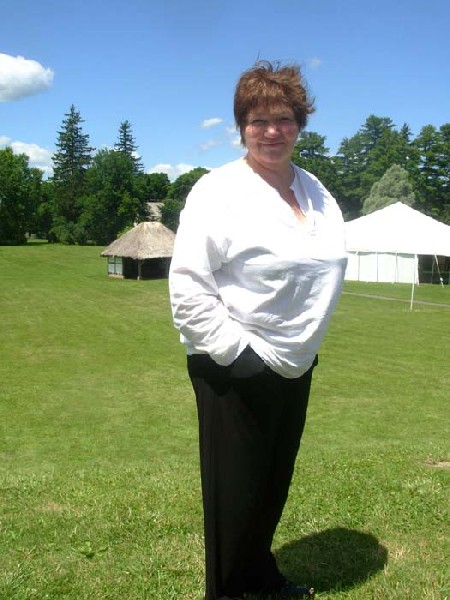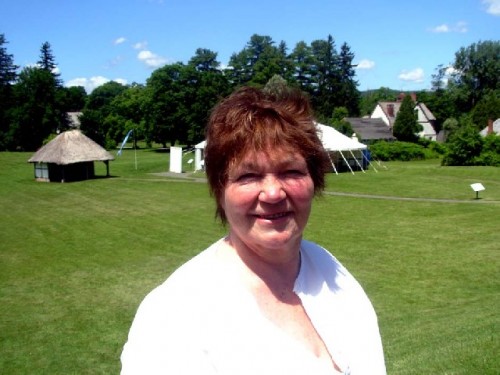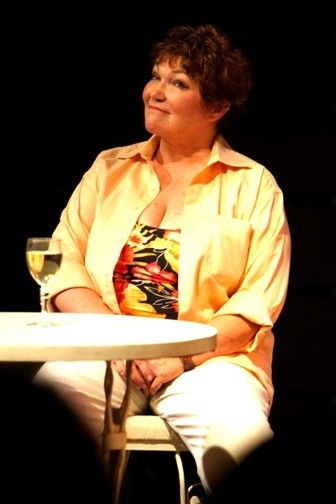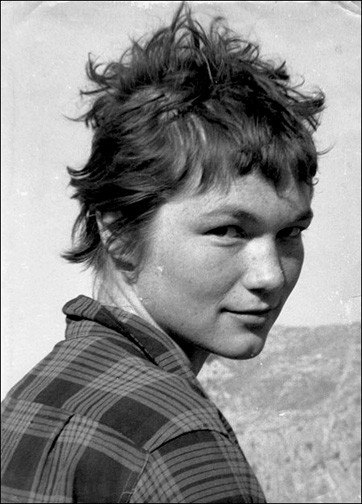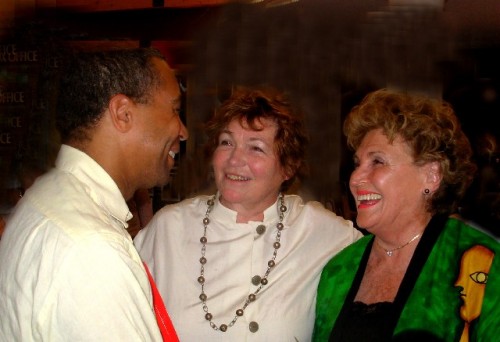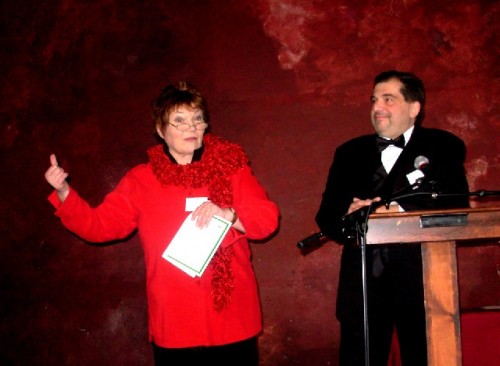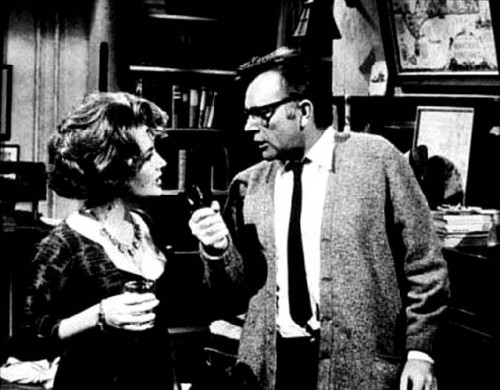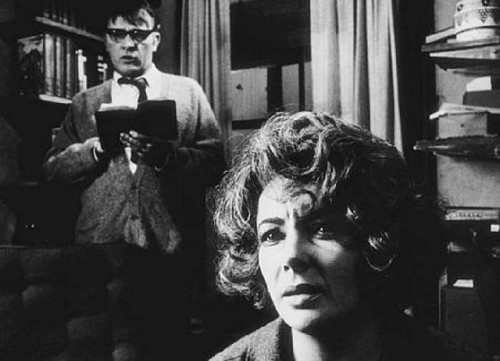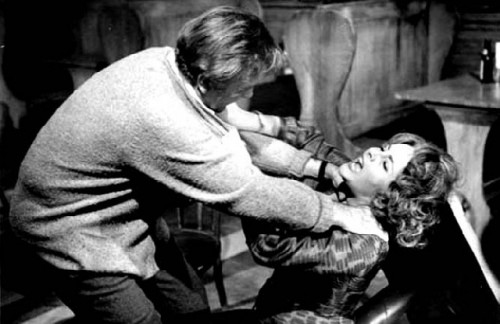Tina Packer's 32 Years of Shakespeare & Company
Why She's Afraid of Virginia Woolf
By: Charles Giuliano - Aug 23, 2009
Sitting over a sandwich at Shakespeare & Company with Tina Packer, the Founding Artistic Director, I said "Thirty Two Years." She looked at me with a long pause as if to say, well, what's the point. Then she added "Yes, 32 years, it went by in a flash."
For the first time this season the day to day job of running the company, and its record of 18 productions, has been turned over to the new Artistic Director, and long term associate of the company, Tony Simotes. It was a transition that entailed two years of planning. The goal was to have the company in good shape with a new facility, a start on an endowment, and reduction or even elimination of debt.
Then the economy tanked and it has been a scramble for arts organizations ever since. In setting up the current schedule it was Packer's idea of working out of the hole by putting on a lot of shows. Particularly inexpensive, bare pipe productions like the three, one women shows of the pre season Diva Series. Packer starred in one of them "Shirley Valentine." As well as bringing back prior productions such as last year's hit "Othello" starring John Douglas Thompson, as well as "Hamlet," and the return to Lenox of the touring production of "Romeo and Juliet." The production had been on the road for several months and played to an audience of some 50,000.
The current state of the economy is just another bump in the road to a company which has endured for three plus decades. I implied to Tina, and she did not disagree, that one must bit a bit mad to start and attempt to sustain a theatre company. This evoked the familiar, throaty outburst of laughter that is her signature response to yet another absurd conundrum.
The idea of starting her own company began, at age 39, when she was in flux between her native Great Britain and working in the States. "I started a company rather early on but didn't think I would be doing it for the rest of my life. I was dividing my time between England and America. It was horrid but kind of funny. I thought, I can't believe that I am in this predicament. The humor increased over the years. Life can be tragic but also funny. It is one of the things that allow me to keep going."
There was an opportunity presented to her by Mitch Berenson to locate the fledgling company at The Mount the former home of Edith Wharton in Lenox. At the time she had a Ford Foundation Grant to undertake a project with Elizabethan Theatre. For eleven months there was funding for 15 actors, three stage managers, and five master teachers. She recruited the group in England and The Mount became a place where they could all live and work together. While this was happening Packer received another offer.
"I was asked to take over the Boston Shakespeare Company" she said. "The Artistic Director, Peter Sellers, left to become the head of the Kennedy Center in Washington, D.C. The company had been started by a priest and was 15 years old. Sellers left them high and dry. It was a small company when he took over. In one year he had doubled and tripled the budget. The company was in debt when I was asked to help it. The company was located in a lovely 400 seat theatre on St. Botolph Street. The theatre no longer exists and the building has been turned into condos."
When she discovered the degree of debt Packer decided to cancel the season. "There was no money to pay for the program that Peter had set up. We tried to save the theatre. At that time there was very little theatre in Boston. There was the Lyric Stage with Polly Hogan. But there was nothing like the thriving community there is now. It seemed important to save the theatre. We got the city and the Musician's Union, which owned the building, to assure me another five year contract. Because of the rising property values they sold the building for condos and moved to the suburbs. That began a fight with the city for a plot of land on St. Botolph Street to build a new theatre. The city would put up $2-3 million and the state would put up $2 million. We would be given the land for no money. The plan was to build a theatre and condos to help pay for it."
There seemed to be progress "We had an architectural competition and it seemed to work financially. Then the condo market collapsed. Back in the Berkshires S&Co began to wobble. There wasn't the chance to wait it out. I didn't have five years to turn it around. I was going up and down the Mass Pike from Lenox (S&Co.) to Boston (BSC). In Boston we did a year of Irish plays. We did 22 Irish plays including readings, workshops, and two full productions. At that time Ray Flynn (Mayor of Boston) was a supporter of the IRA (evoking a bemused expression from Packer). During that time I met some smashing people. That included Seamus Heaney and Padraig O'Malley of U. Mass. Boston."
When plans for a new theatre fell apart Packer focused on developing S&Co. which had its own challenges. It is ironic that the prototype that she worked on, to combine a new building with theatre and condos, was exactly the model for development by the Boston Center for the Arts. In a land swap deal BCA ended up with a theatre complex, the first new Boston theatres in more than a century, developed by the Druker company.
Stepping back from management of S&Co., while still performing, directing, fund raising and teaching, allows more time for Packer to concentrate on her own creativity. We got a glimpse of that with a magnificent revival of "Shirley Valentine." Overall the show did well with one sold out performance in the Elayne P. Bernstein Theatre. This was a two week, early season run with mid week performances. It was not the best test of her drawing power. Tony Simotes discussed with me plans to have Tina lead the season next year with a production to run through June into the July Fourth weekend. Tina will also direct a play which they feel has New York potential. It is too early to confirm but it is a play with a Berkshire based playwright.
Being the artistic director of a company comes with so many demands and responsibilities that it is difficult, if not impossible, to focus on one's own creativity. Had life been played differently, arguably, Packer would be more widely known as an actor. It is a part of the sacrifices made in the tasks taken on. We talked about her first love, acting.
"I did 'Shirley Valentine' for four months fifteen years ago at the Charles Playhouse in Boston" she recalled. "I like the play even better now. It is the power of her imagination. The film version is still delightful." I asked if it is true that she will play Martha in Edward Albee's "Who's Afraid of Virginia Woolf" in Boston this season. "I am" she said. Is it true that you're scared I asked? "I am" she said. "We are doing it at the Publick Theatre of the Boston Center for the Arts. I am scared stiff. With Shakespeare I have the form and technique. While Albee is a master of American drama it's a different kettle of fish. The play opens October 1 and runs through October 24."
Arguably it is Albee's greatest and most demanding play. The film starring Richard Burton as George and his then wife, Elizabeth Taylor, as Martha continues to be riveting no matter how many times it is seen. Both in the film as well as their personal lives the Burtons were tearing each other apart. When not savagely attacking each other they enjoyed playing "Get the guests." Many of us have endured those dinner parties when a pleasant evening turns nasty.
As an actor, just where does one dig into the psyche to find such characters? Just what kind of human toll is involved in portraying these roles? What are the risks and occupational hazards? What of the issue of the age of Martha? Elizabeth Taylor (born 1932) was 34 when she played Martha. Tina, who is 71, seemed taken aback by these concerns which revealed her misgivings.
"The question is can I play it?" she responded. "The guy who runs the theatre asked me to do it. The play will be directed by Diego Arciniegas. I think it would be stupid not to take on the challenge." Regarding Elizabeth Taylor she responded that "I saw Uta Hagen perform Martha on stage. It is the best play by Albee but I don't understand a lot of it. Like the stuff with the child. It is a time of deep antipathy and I am not sure why. It surfaced at a time (1966) when there was a lot of uncertainty about politics. The characters have a desire to destroy each other. It is one of the reasons why I'm scared and makes me think I shouldn't play the bloody thing."
There is more to it than the challenge of a demanding role in a difficult play. "For 32 years I put my passion into how to sustain a theatre company. Under that circumstance it is very difficult to act. That takes a different part of the brain. Yes, you might go to a dark place in a role from Shakespeare but the verse is sublime and divine in the form. That's not true in Albee. The form is the darkness as well. The truth is that it takes you into an area of the brain and the body that doesn't register it as imagination. You step in and sometimes it takes several hours to step back out. That's what happened when I was doing 'Shirley Valentine' for several months in Boston. Around 4 PM I would start to get into it. You have to live with it. That's what scares me. Martha and George are trying to destroy each other. I'm trying to see how good an actor I am. Two years ago I did Cleopatra."
I asked about the reviews. Like a lot of actors she doesn't read them. As the director of the company she reads reviews or they are brought to her attention by staff. But she avoids seeing reviews of her own performances. "I read them after the season" she said. "There might be something you are struggling with in the performance. For Cleopatra there were two kinds of reviews: Raves, and really horrible ones."
In S&Co.'s publication Play On she is quoted "I'm more terrified of doing that (Virginia Woolf) than I was of Cleopatra. I don't have the Shakespeare text to hold me. I don't have as much of a reputation with modern works. I'm full of trepidation. But I'm glad."
Her sabbatical from the Lenox campus will continue after the Boston play closes at the end of October. For the first time since founding S&Co. she will appear on the stage in Great Britain. She will perform as Martha in "Through the Leaves" by Franz Xaver Kroetz at Colchester's Mercury Theatre Company. She will join several alumni of S&Co.'s Training Program. After a double header of Marthas we imagine that by early 2010 she will enjoy coming back to Lenox.
In addition to the 18 productions this season there is much more to S&Co. There are two major programs: Education and Training. There are varying degrees of length of time as well as degree of age and skills. There are high school teachers who come in for intensive training and then bring those skills back to their students.
Simotes discussed a new role for Packer as the designated hitter for the company. "That sounds like Tony" she said. "I can hear him saying that. We planned for a couple of years but it couldn't have been a more difficult time for him to come in with a bad economy, a fear factor, a capital campaign, and ongoing bank debt. So there are two problems and not just one."
Early in the season when she and Simotes pitched to audiences after performances they stated that they needed to raise $1.2 million to qualify for a grant of $800,000 from the Kresge Foundation. I asked what progress has been made since then. By mid July Packer reported that they have brought in an additional $200,000 with a million to go. The deadline is to raise that money by June, 2011 but there is also the ongoing debt service of the bank loan.
"The schedule of 18 productions was the solution for this year" she said. "There was the chance to do revivals of 'Othello' and 'Hamlet' as well as to bring home 'Romeo and Juliet" which hadn't been seen in Lenox. We also were able to present 'Shirley Valentine' 'Golda's Balcony' and "Charlotte Salomon' inexpensively. But no matter what you do it costs money. For 'Hamlet' for example it cost $800 to replace the mattes we fight on. We try to spend as close to nothing as possible by presenting short, sharp plays. 'Golda's Balcony' has its following and we presented eleven performances. We decided to go ahead with 'Charlotte Solomon.' Bill Gibson had just died and it was his last play. We have people in and out all of the time. There is the music and poetry just like an Elizabethan company. Now we've got the Bernstein theatre and we have to keep it flowing so we are building a good audience for year round theatre."
Is it working I asked? While "Bad Dates" was a success in the winter because of the design of the set it wasn't possible to move it into the summer season. It would have been perfect for the Diva Series but the production would have to be redesigned. There were numerous meetings about the problem. Out of that thinking process evolved a different approach to the production for Elizabeth Aspenlieder in "Dangerous Liasons" in the winter of 2010. Packer predicts that the "Set will consist of furniture." And, we assume, not much more. Why, given a state of the art shop for set construction does S&Co. put on those bare pipe productions? Packer was a bit irritated when she answered "Do you think I like that. It's about money." Funding productions and maintaining a company has always been an issue.
This brought us to the early days and struggles at The Mount. The dialogue with Packer will continue in Part Two.

